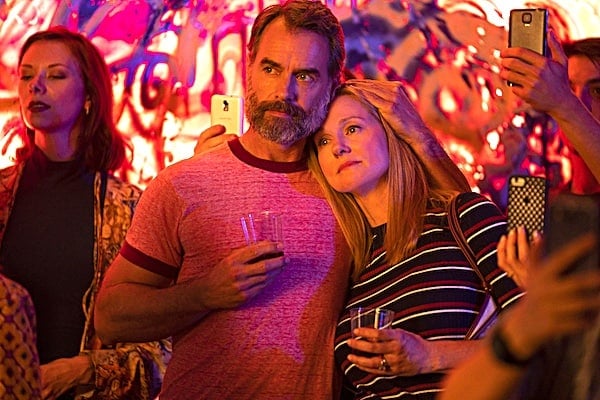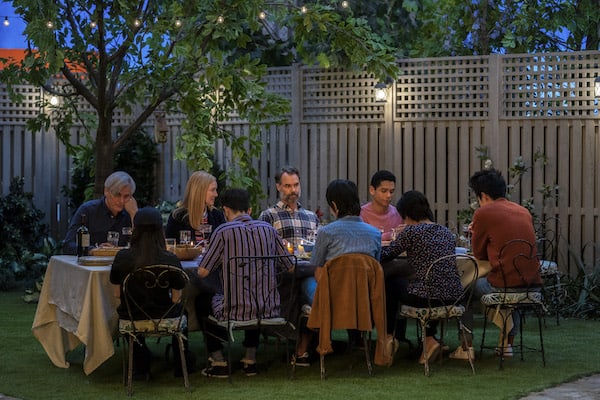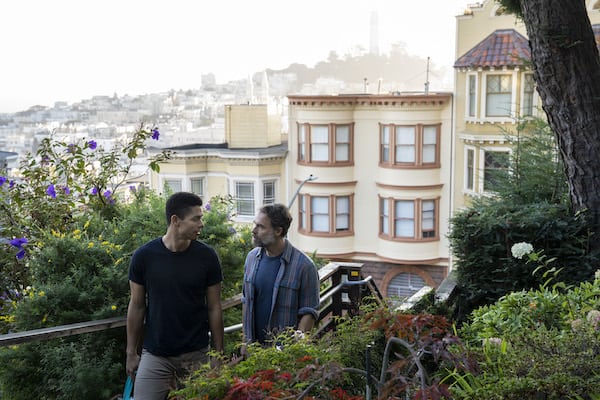
Just in time for Pride month, Netflix is taking viewers back to 28 Barbary Lane, the queer wonderland at the center of Tale of the City.
The beloved series based on the work of Armistead Maupin already spawned three previous miniseries starring Laura Linney and Olympia Dukakis. Revolutionary in its portrayal of 1970s life in San Francisco, the series boldly depicted sexuality, nudity and marijuana use (even on PBS!).
At its core, though, it's always been about family — chosen and otherwise. The beauty of Tales has always been the magical world Mrs. Madrigal (Dukakis) created as the landlady of 28 Barbary Lane. The update honors its roots with a vibrant new cast of characters creating their own community.
However, where it really shines is how it broadens the scope to integrate more diversity. With executive producer Lauren Morelli, best known for her work on Orange Is the New Black, at the helm and an all-LGBTQ writing staff, the series deftly handles race, gender expression and sexuality. (And even manages to address some things from earlier adaptations that may not have aged as well by today's more woke standards.)
Of course, what made Tales such a compelling watch was its soap opera twists and mystery. The new iteration has its own intrigue to keep viewers binge watching, but we won't give too much of that away.
Fans of the original will already be on board to revisit Dukakis' Madrigal, Linney's Mary Ann and, of course, Michael “Mouse” Tolliver. This time he's portrayed by Looking‘s Murray Bartlett, (a man whose face should appear in the dictionary next to the phrase “ruggedly handsome”).
We spoke with Bartlett about his relationship to the original series, life on Barbary Lane and the scene in the series everyone will be talking about.

How familiar were you with the series before joining this cast?
I was a huge fan. I saw the first season of the show when I first went to San Francisco in the 90s. The guy I was staying with had Tales of the City on VHS, so I watched it. It had a huge effect, like it did on a lot of people at that time. It was like these queer characters on TV sort of like living their best lives. They're like a family and this really wonderful community, which is also what San Francisco felt like at the time for me. So it had quite a profound effect on me, really. I fell deeply in love it and watched it a number of time over the years. I came to the books after I've seen the first season, but I went on to read the books as well.
Were you living your own Barbary Lane fantasy at the time?
Well, I was only [in San Francisco] for a few weeks. I never spent big chunks of time there until I was working on Looking, but I loved it. I never quite had that setup in my life, but I did have a close sort of family of friends around me that felt kind of similar.
It's hard not to draw parallels to Looking, another series about queer people in San Francisco. How did your experience on Looking inform what you brought to this project?
I think it deepened my understanding of San Francisco and the community there. We shot Looking in San Francisco, so we really sunk into it in a beautiful way. At the time, Armistead reached out to us or someone had reached out to him or there was some kind of connection made. He was kind of like our godfather when we were there making Looking. We met up a few times, and actually the first time when we went to shoot the pilot, we arrived on my birthday in March, and me, Frankie [Alvarez] and Jonathan [Groff] watched Tales of the City. So it was always kind of there in our mind.
I feel like the characters of Dom from Looking and Mouse in Tales of the City are quite different. They're slightly generationally different. Dom's a little younger, and Michael had a very different experience in San Francisco. He's a little bit older, and he went through the whole AIDS epidemic, was positive and lost a lot of people he loved. He was really deep into that. Dom didn't have that. Mouse has a completely different history that anchors him to San Francisco in a completely different way. It informs who he is. Dom is just starting to scratch the surface of who he is, while Mouse was forced to ask big questions and deep dive into facing his own mortality and dealing with loss over big life and death questions.
One of my favorite scenes in the new iteration is the dinner party where there's a big conversation between Ben (Charlie Barnett, playing Mouse's boyfriend) and an older generation of gay men about language and identity. What do you hope is the takeaway from that scene?
I hope it starts a lot of conversations. It deals head on with the kind of intergenerational misunderstandings and different perspectives that don't meet. One of the things I think is wonderful about that scene and that episode is that it throws up the different perspectives and it throws up the issues, but it doesn't give any easy answers. Because there aren't any easy answers. Both perspectives can learn from each other. I hope it starts a lot of conversations about those issues … One of the things that's so great is that you can see that both sides are right, and both sides are wrong. Both have their really strong points, but also their weaknesses. I think there's definitely a middle ground, which I hope a lot of conversations start that can lead us toward learning from the past while moving forward with the knowledge that we've gained from all the stuff that has been earned and fought for — but also embracing the new generational things of identity and how to respect that.

What do you think this reboot gets really right?
It's passing the baton to a younger generation. This team of writers headed by Lauren Morelli has done a beautiful job of doing that, incorporating more of the richness of the queer community. More diversity and putting some of the trans issues and trans characters in the forefront is really important, I think. I read an interview recently with Armistead where he said he was reluctant early on to write characters that he wasn't super familiar with. Now he realizes that was a mistake, and he should have just dove in. He was nervous writing characters of color or trans characters he thought he couldn't do justice to. I feel like this is an incredibly diverse, all-queer writers room that can tell those stories authentically. I think they've done a really great job of widening the lens and trying to do justice to all the different aspects of the queer community now. You can't completely do that ever, but just trying really to broaden it out and be much more inclusive. It keeps the beautiful spirit of community and family and people being able to explore who they are and be true to themselves, but in a much more modern context that feels very true to the queer community now. I think. I hope. That's the intention.
Tales of the City is always a show about secrets. What's one secret from Barbary Lane that you can share from behind the scenes that viewers might not know?
Olympia Dukakis can swear like a sailor in Greek. She was kind of joking, but she was having a fake tantrum or swearing, and she let loose in Greek. That was pretty amazing.
Tales of the City is streaming now on Netflix.



